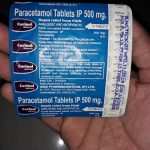Azinet 500mg Tablets: How it Works, Uses, Dosage, Side Effects

Azinet 500mg is a brand of Azithromycin (500mg) produced by May and Baker Pharmaceuticals Ltd. Azinet 500mg belongs to a class of medications called macrolide antibiotics. It works by stopping the growth of bacteria.
Azinet 500mg is used to treat certain bacterial infections, such as bronchitis; pneumonia; sexually transmitted diseases (STD); and infections of the ears, lungs, sinuses, skin, throat, and reproductive organs. Azinet 500mg also is used to treat or prevent disseminated Mycobacterium avium complex (MAC) infection [a type of lung infection that often affects people with human immunodeficiency virus (HIV)]. Azithromycin is in a class of medications called macrolide antibiotics. It works by stopping the growth of bacteria.
Antibiotics such as Azinet 500mg will not work for colds, flu, or other viral infections. Using antibiotics when they are not needed increases your risk of getting an infection later that resists antibiotic treatment.
How to take Azinet 500mg
Your Azinet dosage, drug form, and how often you take the drug will depend on:
- your age
- the condition being treated
- how severe your condition is
- other medical conditions you have
- how you react to the first dose
The typical dosage of Azinet is 500 mg once per day for 3 days. Your doctor may also prescribe 500 mg taken as a single dose on day 1, followed by 250 mg once per day on days 2 through.
Some examples of common dosages include:
| Infection | Dosage |
| community-acquired pneumonia tonsillitis skin infections | an initial dose of 500 milligrams (mg) followed by 250 mg once daily until day 5 |
| mild-to-moderate bacterial COPD exacerbations | 500 mg per day for 3 days OR an initial dose of 500 mg followed by 250 mg once daily until day 5 |
| sinus infections | 500 mg per day for 3 days |
| chancroid genital ulcers | a single dose of 1 gram (g) |
| urethritis cervicitis | a single dose of 1 g |
| gonococcal urethritis cervicitis | a single dose of 2 g |
What to avoid
Do not take antacids that contain aluminum or magnesium within 2 hours before or after you take Azinet 500mg. This includes Acid Gone, Aldroxicon, Alternagel, Di-Gel, Gaviscon, Gelusil, Genaton, Maldroxal, Milk of Magnesia, Mintox, Mylagen, Pepcid Complete, Rolaids, Rulox, Maalox, and Mylanta. These antacids can make azithromycin less effective when taken at the same time.
Antibiotic medicines can cause diarrhea, which may be a sign of a new infection. If you have diarrhea that is watery or bloody, call your doctor. Do not use anti-diarrhea medicine unless your doctor tells you to.
Avoid exposure to sunlight or tanning beds. Azithromycin can make you sunburn more easily. Wear protective clothing and use sunscreen (SPF 30 or higher) when you are outdoors.
Avoid other drugs that can cause QT prolongation or irregular heart rhythm.
What happens if I miss a dose?
Take the missed dose as soon as you remember. Skip the missed dose if it is almost time for your next scheduled dose. Do not take extra medicine to make up for the missed dose.
What happens if I overdose?
Seek emergency medical attention or call the Poison Help line at 1-800-222-1222.

What are the side effects of Azinet 500mg?
Azinet 500mg may cause side effects. Tell your doctor if any of these symptoms are severe or do not go away:
• nausea
• diarrhea
• vomiting
• stomach pain
• headache
Some side effects can be serious. If you experience any of these symptoms, stop taking azithromycin and call your doctor immediately or get emergency medical treatment:
• fast, pounding, or irregular heartbeat
• dizziness
• fainting
• rash with or without a fever
• blisters or peeling
• fever and pus-filled, blister-like sores, redness, and swelling of the skin
• hives
• itching
• wheezing or difficulty breathing or swallowing
• swelling of the face, throat, tongue, lips, eyes, hands, feet, ankles, or lower legs
• hoarseness
• vomiting or irritability while feeding (in infants less than 6 weeks old)
• severe diarrhea (watery or bloody stools) that may occur with or without fever and stomach cramps (may occur up to 2 months or more after your treatment)
• yellowing of the skin or eyes
• extreme tiredness
• unusual bleeding or bruising
• lack of energy
• loss of appetite
• pain in the upper right part of the stomach
• flu-like symptoms
• dark-colored urine
• unusual muscle weakness or difficulty with muscle control
• pink and swollen eyes
Azinet 500mg may cause other side effects. Call your doctor if you have any unusual problems while taking this medication.
If you experience a serious side effect, you or your doctor may send a report to the Food and Drug Administration’s (FDA) MedWatch Adverse Event Reporting program online (http://www.fda.gov/Safety/MedWatch) or by phone (1-800-332-1088).
What medications may interact with Azinet 500mg?
Azinet 500mg may interact with other medications a person is taking.
For example, using azithromycin while taking nelfinavir, which is a drug that helps treat HIV, can increase the risk of liver abnormalities and hearing problems.
Azithromycin can also increase the effects of blood thinners such as warfarin.
Other drugs that may interact with azithromycin include:
- digoxin, a heart medication
- colchicine, a gout medication
- phenytoin, a seizure medication
- antacids that contain magnesium or aluminum
A person should tell a doctor about all current medications, supplements, and remedies before taking azithromycin. Always speak to a doctor before you stop taking medications.
Can a pregnant woman take Azinet 500mg?
A person may take Azinet 500mg while breastfeeding but should discuss it with a healthcare professional first. Azithromycin may be safe to use during pregnancy and while breastfeeding. Studies of animals who received very large doses of azithromycin did not find an increased risk of miscarriage or birth defects.
However, there have been no high-quality studies in pregnant humans, so the drug label currently states that “azithromycin should be used during pregnancy only if clearly needed.”
Azinet 500mg can transfer into breast milk and may remain present for 48 hours following a person’s last dose. Although it is generally safe to use when breastfeeding, azithromycin may cause diarrhea, vomiting, or a rash in some babies.
A person should tell a doctor if they are pregnant, might be pregnant, or are breastfeeding before taking azithromycin. If a nursing infant develops side effects while the parent is taking azithromycin, call a doctor for advice.





